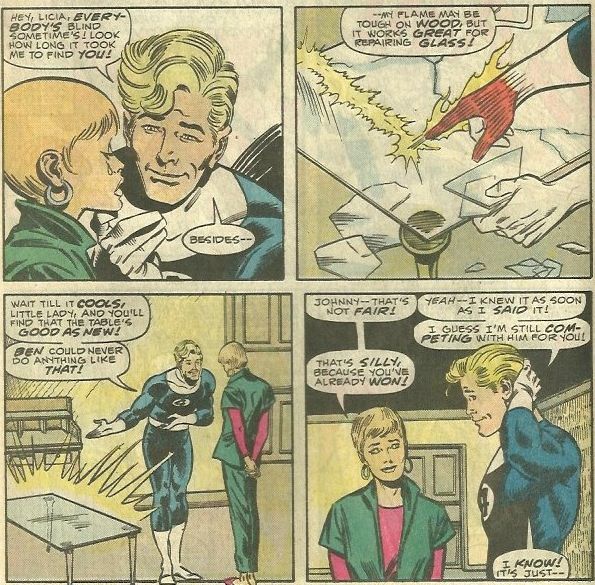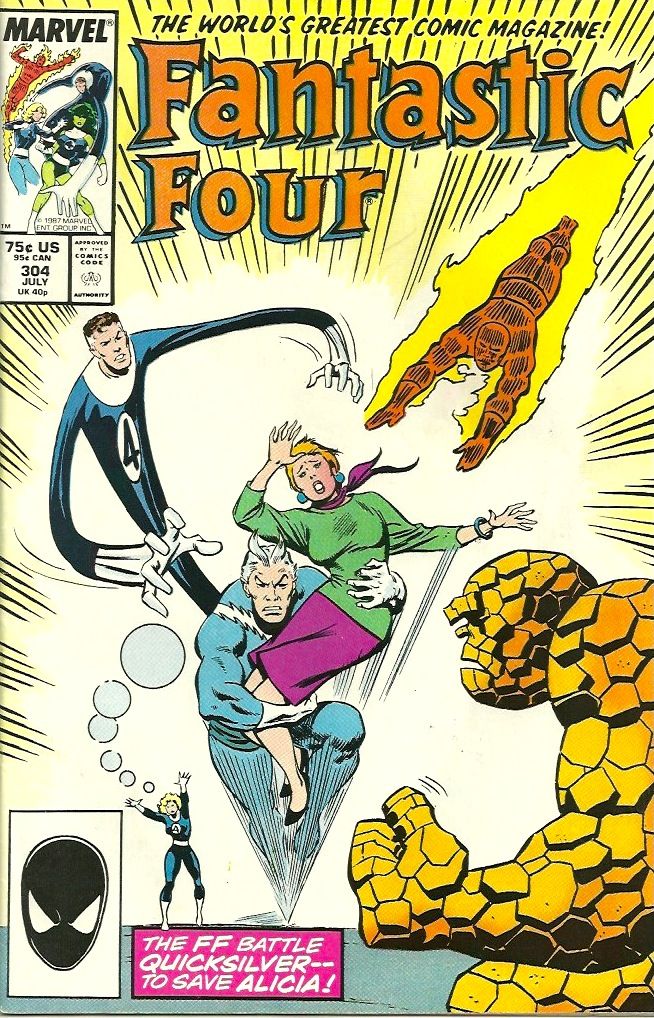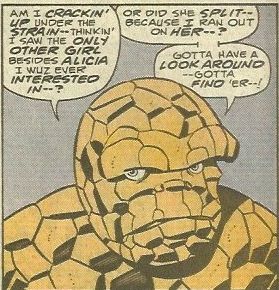A column in which Matt Derman (Comics Matter) reads & reviews comics from 1987, because that’s the year he was born. Click here for an archive of all the previous posts in the series.
1987 And All That: Fantastic Four #304-307 (Marvel) by Steve Englehart, John Buscema, Joe Sinnott, Glynis Oliver (#304-306), George Roussos (#307), Phil Felix (#304), Janice Chiang (#305), John Workman (#306-307), Don Daley (#304), Ralph Macchio (#305-307)
There are two core components to the Fantastic Four: 1. awesome sci-fi superhero excitement, and 2. familial relationships and the drama that comes with them. Every creative team strikes their own balance between these elements, and I'm not here to say one blend is better than any other. I will say that these four issues, the first in a long run written by Steve Englehart, definitely focus hard on the interpersonal stuff (though there's a healthy dose of action in each issue, too), and the results are great. Almost every character we see, whether they're part of the titular team or not, has a lot on their respective plates, everyone carrying heavy personal baggage that informs what they do and how they act in interesting ways. There are villains with pathos, heroes who sometimes act like childish jerks, and many characters who seem as though they might break down completely at any second, adding a nice underlying tension to everything else that goes on. All of this is heightened by John Buscema's expressive artwork, which delivers moments of quiet, brooding reflection with just as much oomph as the most hard-hitting action, and nails everything in between as well. Though these issues are not at all flawless, they're consistently entertaining, they're not afraid to make big, bold moves, and they shake up this title effectively and efficiently, which seems to be their primary goal. And they're a nice reminder that we are all many different thing, that each and every one of us has our own inner turmoils and conflicts to wrestle with, and that these kinds of things don't necessarily ever resolve for good so much as they grow and change and become more complicated over time.
I chose these four issues not just because they mark the beginning of Englehart's time on the series but also because they more-or-less function as a complete arc, the story of Sue and Reed leaving the FF and being replaced by Crystal and Ms. Marvel. The Richards' departure is motivated by their desire to spend more time with their son, Franklin, and help him gain more control over and understanding of his budding mutant abilities. They are putting their parental responsibilities before their superhero ones, a smart move that they probably could and should have made even earlier. But it's not all that easy for them to make the transition, and they stick around for a while even after deciding to leave, because they keep getting wrapped up in new FF-related problems. The announcement that they're leaving comes early in Fantastic Four #304, but it's not until #307 that they actually do it, and even then, Reed struggles not to get involved at the first sign of superpowered danger. Both he and Sue have been in the FF for so long, have devoted so much of their time and energy to playing the superhero game, that becoming full-time parents is an understandably difficult task. They are clearly quite committed to it, but intellectually wanting to make a change and actually doing it in practice are two very different things. It's not a switch that can be flipped but rather a slow, gradual process that must be followed through. Sue and Reed pull it off admirably, making sure to leave the FF in good hands before they head off into their new domesticity, but that takes time, and Englehart is careful not to rush his characters into anything before they're ready. This makes the whole thing more believable and, in the end, more well-earned. It's a shift that occurs for good reason and in a natural way, making it both easier to accept as and more rewarding to watch as a reader.
While Sue and Reed are preparing to leave the FF, Ben and Johnny are trying to find a way to stay on it together in spite of their less-than-friendly feelings toward each other during this time. Their animosity stems from a romantic rivalry of sorts, Johnny having recently married Alicia Masters, Ben's ex-girlfriend and the woman he still loves. This marriage of course bothers Ben immensely, his emotions ranging anywhere from overwhelming self-pity to seething anger, and he has a hard time even acting civil toward Johnny or Alicia, let alone friendly. Alicia is hurt by this, but she does a better job than Johnny of not letting it get under her skin, of letting Ben's problems be his own while she keeps her mind on building a life with her new husband. I suppose this could be viewed as selfish, but it reads to me more like Alicia is choosing the least painful approach for all involved. If she got into it with Ben, trying to defend her marriage to him and/or ease his pain somehow, the open confrontation of everything might actually make it worse. Similarly, when Johnny gets competitive or sarcastic about Ben, Alicia is quick to shut that down, to remind him that he has already won her heart so being mean to his old friend serves no purpose and does no good. She is the most level-headed of the three, but that doesn't mean it's easy for her to see her ex-boyfriend and current husband have so much tension between them over her, especially knowing all she does about Ben and Johnny's history of being close friends and allies.
Johnny, as I mentioned, handles the situation less delicately, often butting heads with Ben and even getting into a physical confrontation with him at one point. But whenever Johnny lashes out, be it to Ben's face or behind his back, it's obvious to everyone (and usually even to Johnny himself) that his behavior is fueled more by feelings of fear, guilt, and sadness than any actual ill will he feels toward Ben. Johnny is happy with Alicia and feels he deserves to be, but that doesn't mean he enjoys hurting Ben over it, or that he doesn't mind the strain it's put on their friendship. He has a lot of conflicting feelings, is what it boils down to, ecstatic to be in love and newly married but bummed about what his new romance is costing him in other areas of his life. He doesn't always deal with these emotions in the best way, but the one thing that he does get right is to prioritize his duties as a member of the FF over all the personal drama. When there is superheroing to be done, Johnny is always ready and willing to do it, even though it means fighting alongside Ben during this tumultuous time.
Ben is, I would say, the real protagonist of these issues, even though Fantastic Four is ostensibly a team book. With Sue and Reed leaving the group, Ben becomes the new leader, and thus it falls on him to find two new members, and to keep the team intact throughout all of his and Johnny's spats and the various other problems that pop up. When, for example, Ben invites Crystal to join the team, his only conscious motives for doing so are because of her past experience working with them and the fact that, in the wake of her intense break-up with Quicksilver (see below), she needs to be around friends and find something to take her mind off of her troubles. These are decent, innocent reasons to ask her to join up, but Crystal is also Johnny's first love, and he hers, so having her around isn't something Johnny is too wild about, and he assumes Ben did it just to try and throw a wrench in his and Alicia's happiness. Ben has to admit to himself that maybe some part of him was trying to do exactly that, but it's not so cut-and-dry, because he genuinely did it for the other reasons I named, too. He's trying to put together and lead the best FF he can, and Crystal fits into that regardless of how uncomfortable she makes Johnny, so Ben brings her aboard and just deals with the consequences as they come, a capable leader making the best choice he can for the greater good of the team for which he is now responsible. Similarly, when he later invites Ms. Marvel/Sharon Ventura to fill out the roster, he does so knowing full well that she's been through significant trauma recently, and that her emotional shakiness may be problematic down the line. Still, he likes Sharon a lot, as a hero and a person, and he knows she feels the same about hm, though it does bother him when she says she hates men but likes Ben since he's not really a man anymore. It's a messy dynamic between them, because while they are both at least somewhat romantically interested in one another, neither of them is ready yet to act on those feelings, and they both know they may never be ready. Even with all that going on under the surface, Ben recognizes a talented hero when he sees one, so Sharon becomes the fourth member of this new FF, and they both set their personal stuff aside as best they can in the name of battling evil together.
Buscema does great work with everyone in this cast, but he's at his best when drawing Ben, which is key to the success of these issues, since Ben is the central figure. With his semi-monstrous appearance, it's all the more important that Ben's inner humanity shine through his exterior, because we have to sympathize with him and believe him as the tender, heartbroken, struggling-to-be-a-better-man character he is. It's not enough to read his words and thoughts, they have to connect with us on that gut level, and that comes from really seeing the hurt and sadness in his person. Buscema could not do a better job in this regard, as he gives Ben a huge emotional range in his facial expressions and body language both. It's such a huge part of why Ben works as a star here, and why any of the heavy-duty melodrama Englehart writes works so well on the page. Of course, it's not just Ben who Buscema does this with; everybody is expressive and nuanced and fully realized in their look, but it is in drawing Ben is that Buscema's best and most important work gets done, which adds weight and significance to just about all of the key narrative beats.
These are dense comics, so I'm only really hitting the broad strokes here, and even then there is a great deal I've yet to talk about, like Quicksilver showing up in full-blown lunatic mode, blaming Johnny for his failed marriage to Crystal because Johnny didn't stop them from getting married in the first place. A man driven mad by his lost love is something Ben can totally understand, so even though Quicksilver is 100% a villain in this book, kidnapping Alicia and generally acting like an arrogant, self-righteous ass, we are asked to see him not as purely evil but instead as deeply damaged. As with several of the heroes, Quicksilver is presented as layered, emotionally injured, and full of powerful feelings he has a hard time coping with, it's just that he exercises far less control over them than anyone else. That's not all that sets heroes apart from villains, but it is certainly a factor, and Quicksilver is an excellent example of how thin the divide between good and evil can be. He's not out to conquer the world or get rich or any of those classic schemes, he just wants to blame someone for all the tragedy in his life, so he lashes out at anyone and everyone from his past who he thinks fits the bill. He is, just like Ben and Crystal and Sharon all, a person who's been through some extremely upsetting, painful, permanently destructive stuff, it's just that Quicksilver came out the other side more twisted and broken than the others.
Conceptually, superheroes as a whole are extremely simple, but every one of them is also meant to be a person, and people are endlessly complicated. You can want the same big-picture things as someone else and still hate them on a personal level; you can see the good and bad in somebody at once and feel two different things about them simultaneously as a result. People hide their true feelings, or refuse to even acknowledge what they are, and this leads to all kinds of friction, miscommunication, anger, pain, and other such negative things. Yet it can also work for good when people are able to leave their conflicts behind and come together when it really matters, when the stakes are high enough that everything else becomes instantly less important. And that's the lesson of these Fantastic Four issues, that it's ok to sometimes give into your darker thoughts and emotions, that you don't have to get along with everyone or even anyone all the time, so long as you're capable of dropping that baggage and stepping up when the shit hits the fan. Nobody is just one thing, so Ben can be, for example, a pissed off, jealous ex-boyfriend and a talented, focused team leader at the same time. Sue and Reed are devoted to the FF, but they are also devoted to their family, and must ultimately make a choice between the two and then stick with it no matter what. Johnny is a good, reliable teammate for Ben even when he's not being the best friend to him, and vice versa. The list goes on. Everybody in these comics has a great deal going on, and they all have to find their own balance to make their lives work for them and for the people they care about. It's an ongoing effort for each of them, as these things tend to be in our own lives, but Fantastic Four isn't trying to provide solutions. It's simply depicting real, grounded, uniquely human problems and letting them play out organically, a powerful approach to storytelling that makes for some excellent comics.



